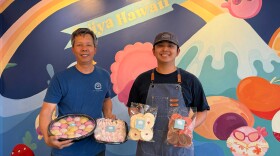Out in Waiʻanae at the Kahumana Food Hub & Organic Farms, state and federal agriculture officials and local food producers met this week to set up a resource hub for local farmers.
Earlier this month, the U.S. Department of Agriculture selected 12 organizations to lead regional food business centers across the country. The USDA chose the Hawaiʻi Good Food Alliance to lead the Island and Remote Areas Regional Food Business Center, which covers Alaska and other U.S. territories.
It’s meant to close the gap to success by offering assistance to navigate national and local resources. Specifically in this case, this center will support indigenous farms, ranches and businesses to promote food security, according to a press release.

"We've been hearing about the need that farmers and food businesses have for technical assistance, to help create business plans or just to help with accounting to really help with the business of running farms," Mae Wu, the deputy undersecretary of marketing and regulatory programs for the USDA, said Tuesday.
"But they also need help with capacity building, and also with coordination, because we really want to build up the local and regional food system that is really the most important part of how we can make our food system more resilient," Wu said.
Resiliency and growth from the pandemic have been a common theme in the development of these centers.
Saleh Azizi Fardkhales is the local director of the Hawaiʻi Food Hub Hui, which is a project of the Hawaiʻi Good Food Alliance. He also serves as the co-project director of the regional food business center.
"What most people like to focus on is the fact that we import 90% of the food we eat," Azizi Fardkhales said. "There's a lot of other percentages that people don't talk about. One of them is that 90% of our farmers are small farmers, and lack access to markets."
The hope is that half of the $30 million grant will go directly to farmers and food hubs. That money will go toward building a system between local food producers and buyers.
"These are the kinds of food systems transformations that we're looking at amplifying with our regional food business center, but we couldn't do it on our own," Azizi Fardkhales said.

The coalition connects Hawaiʻi to places like Alaska, Guam, and even organizations in Puerto Rico and the U.S. Virgin Islands. They'll trade ideas and discuss outcomes within their regions.
"We see that the challenges are very similar," Azizi Fardkhales said. "We're talking food producers, and a lot of people that come from a culture of abundance, where they've been taught how to grow food."
More than 93% of farms in Hawaiʻi are small family farms, state Department of Agriculture Director Sharon Hurd reported. Building up local farmers will help with building outward, she said.
"How do we help them to scale up to be profitable to be a player in the agricultural field?" Hurd said.
It starts with identifying infrastructure needs. Already, the state has invested in growing local infrastructure. For example, the DOA has awarded around $1.35 million in food hub grants.
"We know that by providing the infrastructure they need, we can we can help them scale up as well," Hurd said. "It could be something simple as your new freezer. You need a new freezer to hold food for the next food distribution."





